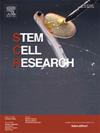从对哌醋甲酯治疗有反应或无反应的多动症患者体内生成诱导多能干细胞。
IF 0.8
4区 医学
Q4 BIOTECHNOLOGY & APPLIED MICROBIOLOGY
引用次数: 0
摘要
注意力缺陷多动障碍(ADHD)是一种多因素神经发育障碍,其发病率在全球范围内呈上升趋势,被认为是一个公共卫生问题。哌醋甲酯(MPH)是治疗多动症的首选药物,但并非所有患者都对这种治疗方法完全有效。因此,探索多动症的潜在分子机制和新的治疗靶点至关重要。在这里,我们利用仙台病毒从四名多动症患者(两名对 MPH 有反应者和两名无反应者)的外周血单核细胞(PBMCs)中生成了诱导多能干细胞(iPSCs)。这些细胞系可能有助于以患者特异性的方式对多动症的病理生理学进行体外研究。本文章由计算机程序翻译,如有差异,请以英文原文为准。
Generation of induced pluripotent stem cells from ADHD patients who do or do not respond to Methylphenidate treatment
As a neurodevelopmental multifactorial disorder whose prevalence has been increasing worldwide, attention-deficit hyperactivity disorder (ADHD) is considered a public health concern. Methylphenidate (MPH) is the drug of choice for ADHD; however, not all patients respond fully to this treatment. Therefore, exploring the underlying molecular mechanisms involved in ADHD and potential novel therapeutic targets is crucial. Here, we generated induced pluripotent stem cells (iPSCs) from Peripheral Blood Mononuclear Cells (PBMCs) retrieved from four ADHD patients (two MPH responders and two non-responders) using Sendai virus. These lines might be helpful for the in vitro investigation of ADHD pathophysiology in a patient-specific manner.
求助全文
通过发布文献求助,成功后即可免费获取论文全文。
去求助
来源期刊

Stem cell research
生物-生物工程与应用微生物
CiteScore
2.20
自引率
8.30%
发文量
338
审稿时长
55 days
期刊介绍:
Stem Cell Research is dedicated to publishing high-quality manuscripts focusing on the biology and applications of stem cell research. Submissions to Stem Cell Research, may cover all aspects of stem cells, including embryonic stem cells, tissue-specific stem cells, cancer stem cells, developmental studies, stem cell genomes, and translational research. Stem Cell Research publishes 6 issues a year.
 求助内容:
求助内容: 应助结果提醒方式:
应助结果提醒方式:


